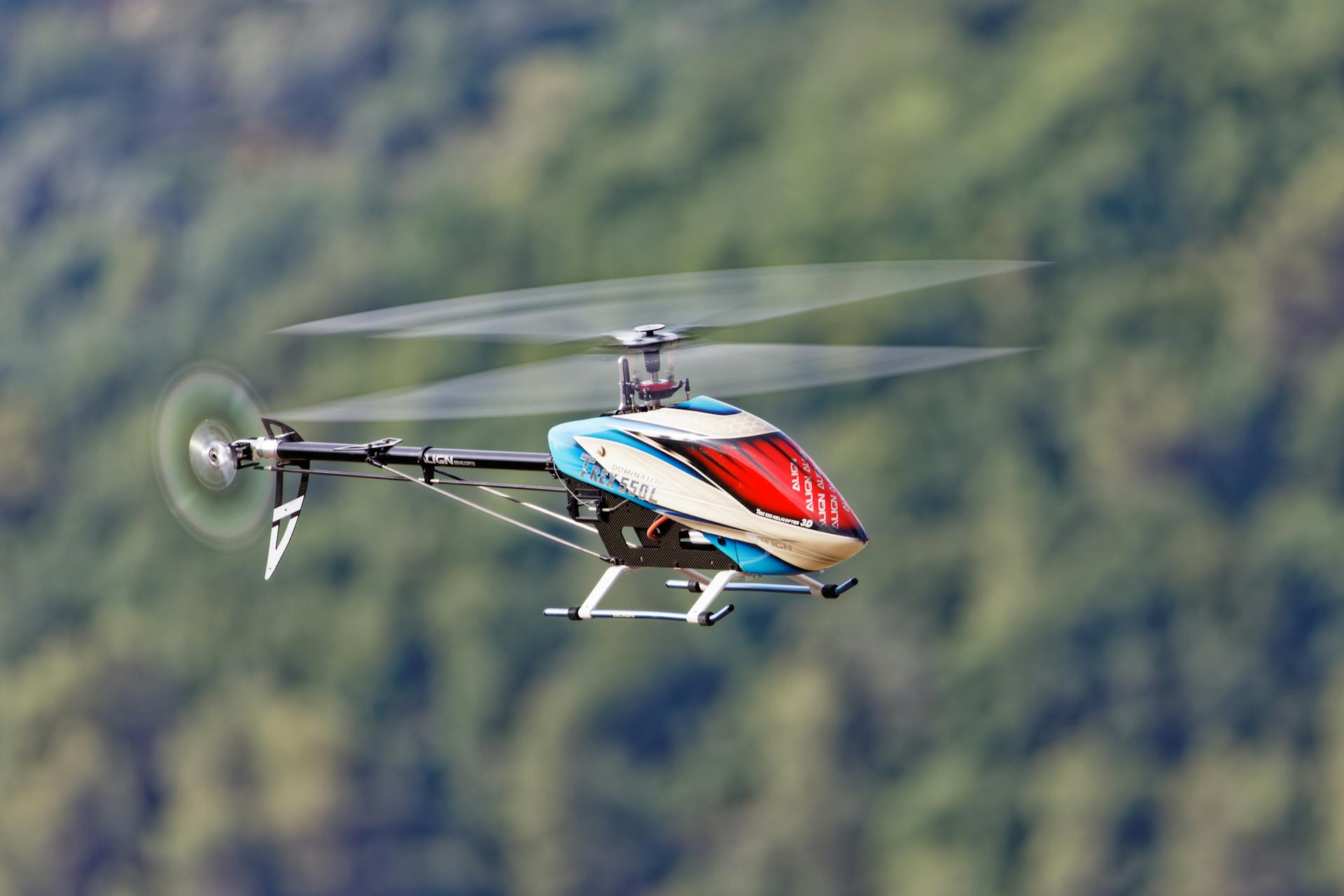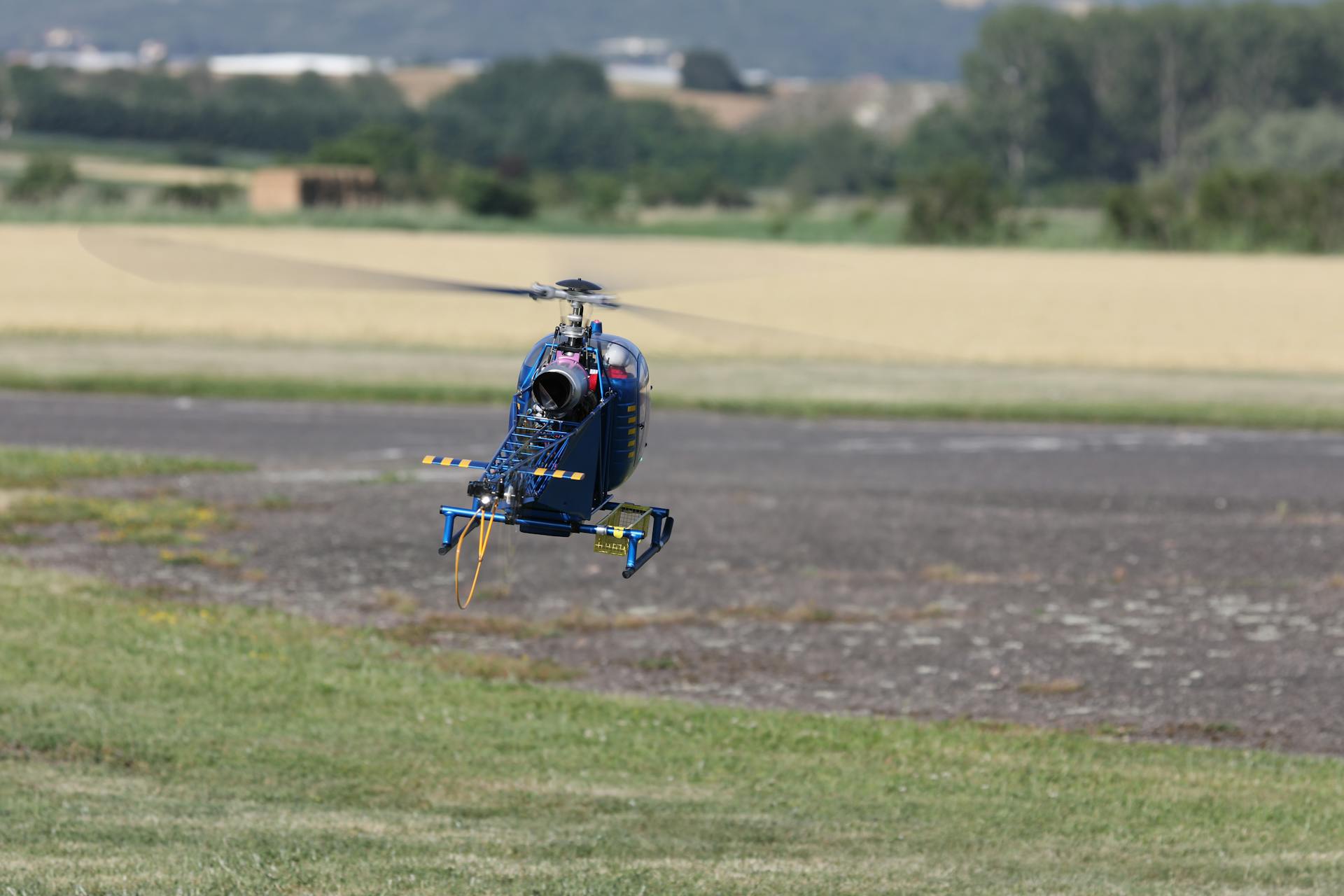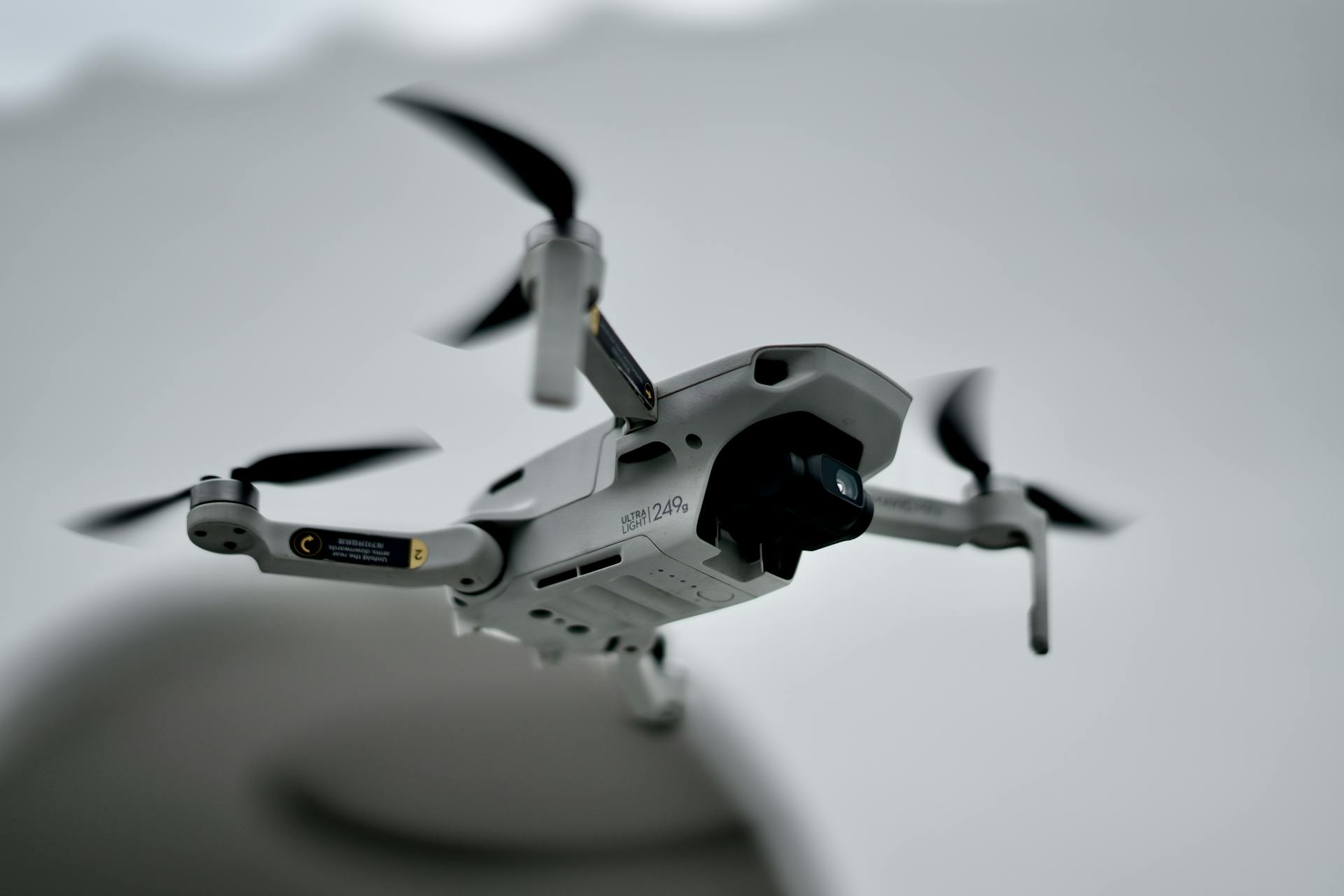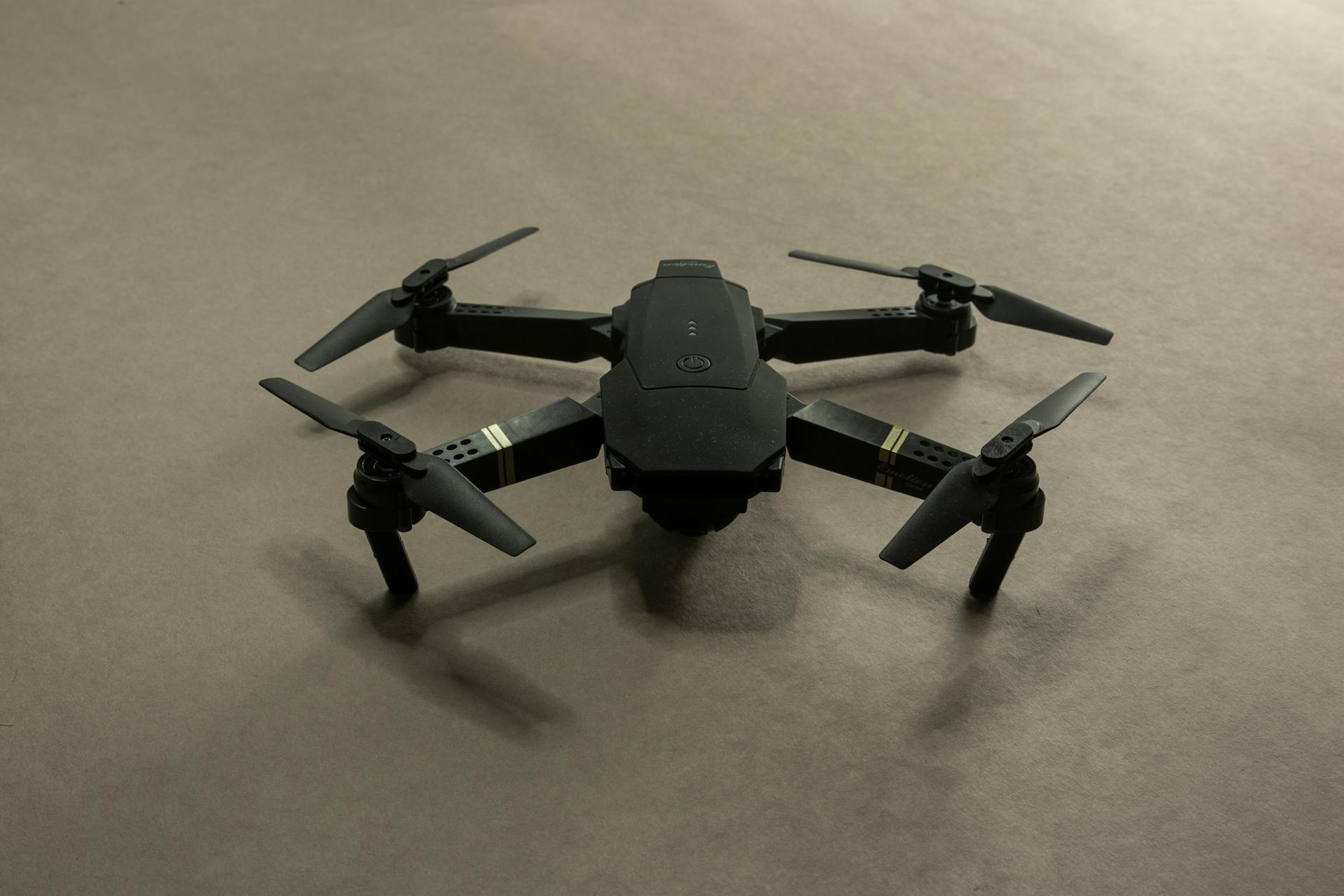
When it comes to performance and efficiency, drones and helicopters have distinct advantages. Drones can fly for up to 2 hours on a single charge, while helicopters require frequent refueling and maintenance.
Drones are also significantly lighter, with some weighing as little as 1.5 pounds, making them easier to transport and store. This is a far cry from helicopters, which can weigh over 5,000 pounds.
One notable exception to this is the DJI Mavic 2, which can reach speeds of up to 45 mph, making it one of the fastest drones on the market.
For another approach, see: Unmanned Helicopters
Drones vs Helicopters
Drones are unmatched for capturing breathtaking aerial photography or videography, making them ideal for a wide range of uses.
If you're looking to create social media content or professional filmmaking, drones are a great choice. Their built-in cameras and advanced flight capabilities make them perfect for the job.
RC helicopters, on the other hand, are best suited for hobbyists who enjoy the challenge of manual control and acrobatics.
Ukrainian Fpv Hits Russian Mi-28
A Ukrainian first-person-view (FPV) drone hit a Russian Mi-28 attack helicopter over Russia's Kursk Oblast on Aug. 6.
The drone was operated by the Special Operations Center "A" of the Security Service of Ukraine (SBU) and successfully hit the helicopter's tail rotor.
Footage of the FPV drone ramming into the helicopter began circulating social media on Aug. 6 and was later published by Ukrainian activist Serhii Sternenko.
This is reportedly the first case of a successful hit by an FPV drone against a helicopter mid-air, according to Sternenko and several other observers.
The SBU source described the operation as "a unique special operation in military history" and a demonstration of the agency's "high level of professionalism, creativity, and innovation".
Russian military blogger Alexei Zemtsov claimed that the helicopter was forced to land and that the crew survived, with the aircraft sent to repairs.
You might enjoy: Quad Helicopter Drone
Which One Suits You?
If you're considering getting into the world of RC flying, you've got two main options: RC helicopters and drones. RC helicopters are best for hobbyists who enjoy the challenge of manual control and acrobatics.
Broaden your view: Rc Military Drone
Flying an RC helicopter requires skill, but the reward is in mastering a machine that feels like a true extension of your abilities. You'll typically find RC helicopters used in competitive flying or within RC flying clubs.
On the other hand, drones are unmatched for capturing breathtaking aerial photography or videography. With their built-in cameras and advanced flight capabilities, drones are ideal for a wide range of uses.
Here's a quick rundown of the two options:
- RC Helicopters: Best for hobbyists who enjoy manual control and acrobatics.
- Drones: Ideal for capturing aerial photography or videography.
Quadcopters
Quadcopters are the most amazing of all three types, offering the best of both worlds – stability and flexibility. They're perfect for beginners and have a variety of purposes in the real world, including security, surveillance, photography, and agriculture.
A good quality quadcopter with stabilization features, camera, and FPV can be bought for as low as $300 today, offering excellent manoeuvring and easy flying. This makes them an excellent choice for short range stunts and 3D flying.
Quadcopters are also cheaper to repair than helicopters if you go down crashing, especially in the cheaper end of the spectrum. This is a significant advantage for those who are new to flying or prone to accidents.
If your primary purpose is to take photography and video, an RC quadcopter is the way to go. Most quadcopters released today offer excellent photography and videography features that are hard to find in RC planes or helicopters.
For another approach, see: Quadcopters Drones
Key Features
Drones have a significant advantage over helicopters in terms of ease of use.
Their multiple rotors make it easier to control them than a helicopter's single rotor, which can cause toppling and tilting at high speeds.
Modern drones also have onboard software that enhances stability, making them even easier to control.
This technology helps drones stay steady and level, even in windy or bumpy conditions, giving pilots more confidence and control.
A unique perspective: Remote Control Military Drone
Loitering Munitions Evolution
Loitering munitions have become the weapon of choice for modern militaries, thanks to their precision and versatility.
These drones can hover over a target for an extended period, allowing for accurate targeting and minimizing collateral damage.
Their ability to loiter over a target makes them ideal for urban warfare or areas with a high risk of civilian casualties.
Loitering munitions have been around for a while, with their evolution starting to take shape in the early 2000s.
Their development has been driven by advances in technology, including improvements in propulsion systems and sensor capabilities.
Key Features
RC helicopters and drones are both awesome little flying machines, but they have some key differences. One of the main differences is in cost and accessibility.
RC helicopters can be more affordable at entry-level, but high-end models can get expensive. However, they don't require much in the way of accessories. In contrast, drones like DJI models can range from budget-friendly to high-end professional, but the features and camera capabilities make them worth the investment.
Discover more: Rc Drone Plane

RC helicopters have a steeper learning curve than planes, but once you master them, you can have tons of fun. They offer more manoeuvrability and higher flight times than quadcopters due to fewer motors. If you love short-range stunts and moves, helicopters are ideal.
Here are some key features to consider:
- RC helicopters are more responsive and easier to control than quadcopters without stabilization features.
- Helicopters have a lesser number of control channels, making them easier to control.
- RC helicopters are more likely to crash as a beginner, so be careful!
- Repairing a helicopter can be expensive.
In terms of photography and video, RC helicopters aren't the best pick due to their lack of stability and centre of gravity. However, with proper camera placement, it's still possible to take great photos and videos with a helicopter.
Control
Control is a breeze with drones. A simple press of the return-to-home button brings the drone back to the takeoff point.
Their software and GPS systems allow drones to fly out of sight, so you can focus on the remote control's screen instead.
Drones have multiple rotors, making them easier to control than helicopters. This feature is especially useful at high speeds, where a helicopter's single rotor can cause toppling and tilting.
Modern drones have onboard software that enhances stability, making them even easier to control.
On a similar theme: How to Make a Remote Control for a Drone
Frequently Asked Questions
Can a drone damage a helicopter?
Yes, drones can potentially damage helicopters, especially in emergency situations where timely medical care is critical. This can lead to delays in receiving life-saving treatment.
Featured Images: pexels.com


